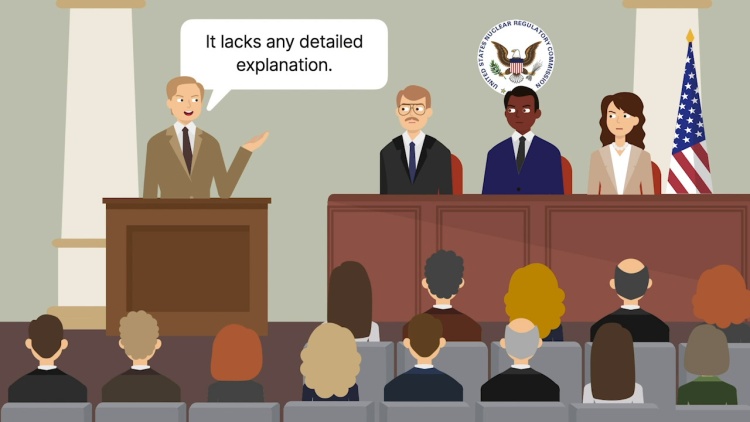Natural Resources Defense Council, Inc. v. Nuclear Regulatory Commission
United States Court of Appeals for the District of Columbia Circuit
547 F.2d 633 (1976)
- Written by Peggy Chen, JD
Facts
In 1972, the Nuclear Regulatory Commission (NRC) instituted a rulemaking proceeding to consider whether the environmental effects of the nuclear waste should be considered in individual cases deciding whether to license a particular nuclear plant. It considered two options: (1) leave the environmental impact factor out of the cost-benefit decision completely or (2) compute the environmental impact for a particular plant based on the amounts of chemical and radiological elements that the plant would add to the environment. The NRC held a public hearing on the two proposals. It made available before the hearing the Environmental Survey, a commission staff report which had concluded that the environmental impact of nuclear waste disposal was minimal. The NRC did not allow discovery or cross-examination of any of the witnesses at the hearing. Groups such as the National Resources Defense Council (NRDC) (plaintiff), a public interest environmental group, participated in the hearing. The only discussion of the environmental impact of nuclear waste was a 20-page statement by Dr. Frank Pittman, director of the NRC’s division of waste management and transportation, which was delivered at the oral hearing. The statement was then adopted into the revised version of the Environmental Study published after the comment period. In April 1974, the NRC adopted the second option. The NRDC petitioned the United States Court of Appeals to overturn the NRC’s decision to adopt the rule, arguing that the refusal to allow cross-examination of witnesses or other discovery violated the National Environmental Policy Act’s requirement that adverse environmental effects be investigated to the “fullest extent possible.” 42 U.S.C. § 4332.
Rule of Law
Issue
Holding and Reasoning (Bazelon, C.J.)
What to do next…
Here's why 899,000 law students have relied on our case briefs:
- Written by law professors and practitioners, not other law students. 47,000 briefs, keyed to 994 casebooks. Top-notch customer support.
- The right amount of information, includes the facts, issues, rule of law, holding and reasoning, and any concurrences and dissents.
- Access in your classes, works on your mobile and tablet. Massive library of related video lessons and high quality multiple-choice questions.
- Easy to use, uniform format for every case brief. Written in plain English, not in legalese. Our briefs summarize and simplify; they don’t just repeat the court’s language.





